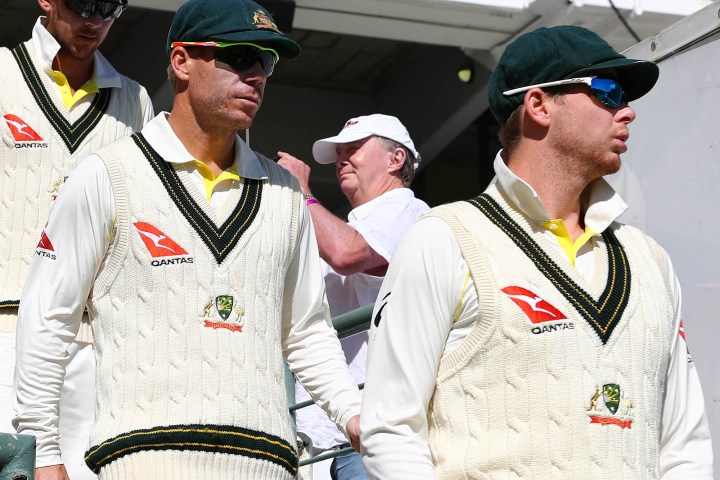CRICKET: OP-ED
Smith and Warner’s presence in SA raises legal and disciplinary questions

The return of Australian cricketers Steve Smith and David Warner to South Africa after the infamous 2018 ‘sandpaper gate’ scandal raises some interesting legal and disciplinary questions.
Smith and Warner have been back in South Africa for nearly two weeks on the current tour. The pair were captain and vice-captain when Australia infamously committed one of cricket’s cardinal crimes by altering the state of the ball during the third Test of the 2017/18 series at Newlands.
The actions of Cameron Bancroft, who applied sandpaper to the ball, was caught on camera. In the following days, it emerged that he was coerced by Warner and that Smith failed to intervene. Smith and Warner were subsequently suspended by Cricket Australia for a year and Bancroft earned a nine-month ban.
The word “crime” is used purposely in this context because under South African law, what happened at Newlands nearly two years ago does fall into the criminal sphere.
Their actions also bring into question sanctions imposed by the International Cricket Council (ICC) for players involved in match-fixing, which are generally heavy, which can include prison sentences, and those of ball-tampering, which are much lighter.
The Prevention and Combating of Corrupt Activities Act, passed in 2004, covers many different forms of corruption, all neatly labelled. From witness tampering to bribery of state officials or private-sector employees, distortion of tenders or auctions and many others.
Section 15 of the act deals with sports events.
The act defines a sporting event as: “any event or contest in any sport, between individuals or teams, or in which an animal competes, and which is usually attended by the public and is governed by rules which include the constitution, rules or code of conduct of any sporting body which stages any sporting event or of any regulatory body under whose constitution, rules or code of conduct the sporting event is conducted”.
The law has three sub-sections. The first two are aimed at punishing all forms of dishonest performance or conduct that seeks reward for feeding illegal gambling.
The third sub-section, though, is where Warner and Smith come in.
The law provides that: “anyone who, directly or indirectly carries into effect any scheme which constitutes a threat to or undermines the integrity of any sporting event, including, in any way, influencing the run of play or the outcome of a sporting event, is guilty of the offence of corrupt activities relating to sporting events.”
A plan hatched in the dressing room to use sandpaper to rough up the ball, with full knowledge that that would be a serious violation of the laws of cricket that govern the contest and has the potential to “influence the run of play or the outcome” of the match, would certainly be an offending “scheme” — and those involved would be committing a criminal act under South African law.
If any South African citizen were to lodge a complaint to the National Prosecuting Authority (NPA) regarding the activities of Smith and Warner, NPA director Shamila Batohi would have no option but to at least consider the matter.
There is also precedent.
Over the past few years, Cricket South Africa (CSA) has initiated investigations into the match-fixing activities of seven prominent South African professional cricketers.
One in particular, Gulam Bodi, was charged in court, with CSA as the complainant. Bodi pleaded guilty to eight charges of “corrupt activities relating to sporting events” and has been sentenced to five years in jail.
Backed by a bookmaker, Bodi, who had played for the national team and was still an active player at the highest domestic level, had offered players in different teams financial incentives and expensive watches to underperform.
CSA claims that his nefarious scheme was uncovered before it could be implemented and that no matches were affected in any way.
CSA imposed a 20-year ban on his participation in all and any forms of cricket, to add to his woes.
Would a prosecution against Warner and Smith have a chance of succeeding?
Legally, proving that Australia’s tampering with the ball had any material outcome on the match (which South Africa won), would be nearly impossible.
The tearful mea culpas at media conferences that followed the uncovering of the Aussie conspiracy would not be admissible as confessions under South African law. So, nothing that Smith, Warner or Bancroft might have said would be of any value to the prosecutor.
And amid all the tears, hand-wringing and humble apologies to their countrymen, did any of the three sandpaper warriors actually confess to having succeeded in using the sandpaper to alter the condition of the ball?
Significantly, from a legal perspective, the umpires didn’t exercise their discretion to change the ball or to impose a five-run penalty on the Australians, which is what the Laws of Cricket empower them to do if they are satisfied that the condition of the ball has deliberately been altered.
At the end of the day’s play, Bancroft and Smith addressed the media. Bancroft admitted that he had attempted to alter the condition of the ball by rubbing it with a short length of what he said was yellow adhesive tape to which dirt and grit had adhered, forming an abrasive surface. Another bad move. Five days later, and after an investigation into the incident by Cricket Australia, he admitted it was sandpaper.
Even if a prosecutor were to attempt to secure a criminal conviction for ball tampering, what expert witnesses could be called to establish that, in theory and practice, the use of sandpaper on a cricket ball would “influence the run of play” at all, let alone that it would “influence the outcome” of (the) sporting event in question?
Any expert witness would need to know the extent to which the ball had steadily deteriorated from its original pristine condition before the sandpaper had been applied to it. This would enable a scientific comparison to be made to its condition immediately before and immediately after the sandpaper had been applied to it.
An expert witness would need to know how many times, over what period of time, and with what degree of elbow grease the sandpaper had been used before he or she could state under oath that the changed condition of the ball had influenced the run of play or the outcome of the event. A ball-by-ball review of the entire innings would be needed to enquire into other possible causes of ball deterioration.
In short, even the most determined and thorough prosecutor would not succeed under section 15 of the act on the provable facts and the evidence.
And the umpires’ failure to change the ball, after inspecting it, would surely be conclusive evidence that despite whatever skulduggery might have taken place, the condition of the ball had not in fact been altered.
But the prosecutor’s inability to show that there was actually any effective altering of the condition of the ball is not the end of the matter.
Smith and Warner’s continuing jeopardy
Even though there is no prospect that a criminal prosecution for altering the condition of the ball would succeed, where Smith and Warner are vulnerable is their approval, as the captain and vice-captain, of the intended scheme to be carried out by Bancroft and encouraging him or at least allowing him to attempt to “carry into effect the scheme”.
This would be held to make them guilty of directly or indirectly “carrying into effect a prohibited scheme”, without regard to whether the scheme succeeded in its aims and without regard to its impact on the game.
Once Bancroft stepped across the rope surreptitiously equipped and ready for sandpaper action, a prohibited scheme was carried into effect. No matter that it was not successfully completed before it was uncovered.
Bodi was sentenced to five years in prison for conspiring to set up a scheme that we have been assured was never implemented.
Six other South Africa professional cricketers have been banned for long periods for participating in different ways in Bodi’s scheme, but, again, CSA has assured us that no matches were actually affected by their actions.
Despite Bancroft’s failure actually to have altered the condition of the ball, Smith and Warner would be hard put to avoid a conviction under South African law for an attempted act of corruption.
Match-fixing versus ball-tampering in a legal sense
It is easy to say that some offences are more serious than others, but by what common standard are the different offences to be judged when it comes to punishment?
The more than 20-year history of full-blown match-fixing proves that it only occurs in the context of gambling. There is no reason to betray your team other than to be rewarded by those who are able to profit financially from your treachery.
Ditto match-fixing lite — as in bowling a few no balls and wides to order so that a bookie can cash in even if doing so is so unlikely to have an impact on the result that it can effectively be discounted. In the 130-year history of Test cricket there have been only two tied matches out of more than 2,800 contests.
By contrast, altering the condition of the ball is not done with the intention of direct financial gain. It is done to improve the team’s performance and to increase its chances of success — but it takes place with the incentive of a better bonus payment from the team’s board employer. What the Prevention and Combating of Corrupt Activities Act would hold to be “indirect gratification”.
Under South African law, ball-tampering must thus be judged within the context of players’ contracts with the national bodies that offer increased financial reward for success.
If a team achieves success for which they are rewarded financially under their contracts by breaking the rules of the game they are paid to play, they are exacting success money from their employers under false pretences.
Is their crime any less reprehensible than that of the deliberate under-performer who has a payment deal with a bookie?
A salesman on commission who submits false invoices to his employer in order to increase his commission will be fired and prosecuted.
A cricketer who breaks the rules and gives his bowlers better access to reverse swing to knock over more opposition batsmen is in the same position.
Cricket needs customers
As a cricket customer, I was denied the pleasure of watching Smith, Warner and Bancroft playing for Australia in the 2018 Wanderers Test after their hurried withdrawal from the squad and their flight to Australia.
Thousands of other pre-booked paying spectators were cheated out of the promised contest between two of the world’s best teams that they had paid in advance to watch.
Australia called all three home post-haste and brought in two new batsmen almost overnight from Australia with no time to acclimatise to the Wanderers conditions.
Having collapsed to 107 all out in the second innings of the sullied Test once the storm had broken, Australia’s remaining players could only muster 221 and 119 runs at the Wanderers.
Thirty wickets lost for a paltry 447 runs — and the Wanderers Test lost by a mind-boggling 492 runs. That was Australia’s second-biggest loss in its 130-year Test match history.
The sandpaper most certainly “influenced the outcome of a sporting event” — but not in the way the conspirators had intended it to. DM
Keith Lister is a (mostly) retired attorney who served for 20 years on the Gauteng Cricket Board, on or chairing disciplinary committees.




















 Become an Insider
Become an Insider